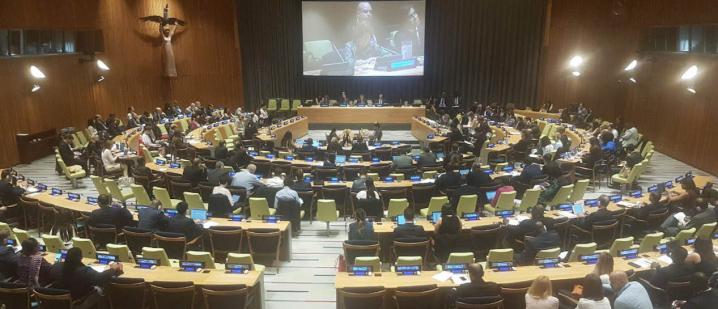CNDH represented the GANHRI at the fourth informal thematic session on the Global Compact on Migration

The National Human Rights Council of Morocco (CNDH) represented the Global Alliance of National Human Rights Institutions (GANHRI) at the 4th informal thematic session on the Global Compact on Migration on the 24th and 25th of July 2017 in the United Nations headquarters in New York.
The fourth informal thematic session entitled “Contributions of migrants and diasporas to all dimensions of sustainable development, including remittances and portability of earned benefits” aimed to build interesting and constructive discussions between Member and Observer States to ensure a positive outcome of the process. This session provided an overview of the links between migration and development, and focused on the multiple aspects and concrete contributions of migrants and diasporas to sustainable development. It was an opportunity to provide a concrete discussion on key economic and financial dimensions of migration and development, including remittances.
On behalf of GANHRI, the CNDH recommended that the Global Compact should reflect obligations as included in the Agenda 2030. It claimed that States should ratify human rights and labour rights conventions that make up the normative framework for migration, development and human rights, and implement them nationally.
The CNDH stressed that the States need to strengthen existing institutions and inter-ministerial coordination mechanisms to ensure both wellbeing as well as facilitation of positive contribution of migrants into both host countries and countries of origin through setting up an adequate system of monitoring and proper implementation of human rights-based labour and migration policies.
Moreover, the CNDH indicated that xenophobia, hate speech and violence are challenges that not only threaten the life and wellbeing of migrants and others but are also contrary to human rights law, and call into question core values of democracy, human rights, pluralism and rule of law. These challenges need to be addressed as a matter of urgency and in line with the international human rights framework.
The CNDH also underlined that the right to social security requires States to ensure the portability of social benefits. Legal, policy and administrative frameworks covering social needs must recognize and protect the cross-national character of migrants.

The 575 billion dollars in global remittances transferred by international migrants to their families in 2016- of which 429 billion dollars were remitted to developing countries- are one of the most tangible economic contributions of migrants to achieving the sustainable development goals in their country of origin, according to the World Bank and the International Fund for Agricultural Development (IFAD). Remittances have the potential to elevate people out of poverty and address their development needs.
Within this context, the CNDH recommended that States should regulate both bank and non-bank money transfer agencies, and consider the possibility of tapping cooperatives of migrant communities as legal modes for money transfer. It recommended as well that States should promote policies that enhance women’s roles such as the financial inclusion of women in the management of remittances.
This session was organized within the framework of the resolution A/RES/71/280 "Modalities for the intergovernmental negotiations of the global compact for safe, orderly and regular migration". In this resolution, the General Assembly requested the President of the General Assembly, with the support of the Secretary-General and by drawing on the expertise of the International Organization for Migration in particular, other members of the Global Migration Group and other relevant entities, to organize a series of informal thematic sessions on facilitating safe, orderly and regular migration that shall address, but not be limited to, the elements outlined in annex II, paragraph 8, of its resolution A/RES/71/1.






















